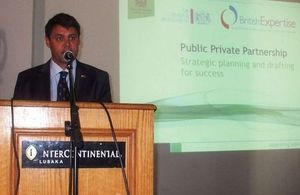British High Commission launches PPP training in Zambia
Acting British High Commissioner Sean Melbourne today spoke at the launch of the Public Private Partnership training in Lusaka.

Sean Melbourne, Acting British High Commissioner
Speaking in Lusaka today Mr Melbourne said:
鈥淔irst of all, I would like to thank those who have made this event possible, including everyone in the High Commission team in particular Matimba Changala our senior Prosperity Officer. 皇冠体育appse events always involve far more work than you could possibly imagine.
鈥淚 am delighted to be here this morning to launch the Public Private Partnership training that has attracted key stakeholders from various sectors of the economy.
鈥淭his training, led by and the , forms part of a wider Southern Africa regional capacity building programme funded by the UK, which will benefit Madagascar, Mauritius, South Africa, Zimbabwe and Zambia.
鈥� 鈥淪ub-Saharan Africa including Zambia has enjoyed more than a decade of high economic growth. Investment in infrastructure is an excellent way to use the benefits of this growth to lay the foundations for more diversified and sustainable future growth. Zambia has a track record of infrastructure investment over the last 5 years, but the needs 鈥� for better roads, telecommunications infrastructure, and yes, how could I forget, power infrastructure - remain great.
鈥淎ccording to the African Development Bank, as much as US$ 93bn will be required annually to meet Africa鈥檚 infrastructure needs through to 2020 with only half of that currently being met. As last week鈥檚 Financing for Development Conference in Addis Ababa concluded, these funds will increasingly come from the private sector and from government鈥檚 own domestic resources.
鈥淭his infrastructure bottleneck threatens to slow the continent鈥檚 progress and Zambia鈥檚 progress too. Diverse models of infrastructure development are essential to achieve sustainable economic growth.
鈥淧ublic-Private Partnerships (PPPs) are a powerful tool to support this process.
鈥淎 growing body of international evidence points to the importance of a favourable regulatory environment and robust institutional framework in developing sustainable and efficient PPP infrastructure projects. I鈥檓 encouraged that the Zambian Government is keen to further enhance these frameworks and build its institutional capacities to secure private sector investment. We welcome, for example, the plan to strengthen central government coordinating functions on PPPs in order to provide policy and strategic guidance to line ministries.
鈥淧artnering with the private sector, and the use of private finance, can bring significant value to complex public infrastructure projects. When well designed, with proper cost recovery, appropriate risk allocation and investor protection, Public Private Partnerships can drive essential infrastructure in a context of limited government budgets.
鈥淒istinguished guests, ladies and gentlemen
鈥溁使谔逵齛pp British Government is keen to promote UK-Zambia trade for the benefit of both countries and to share its expertise in the development and successful implementation of Public Private Partnerships.
鈥淭his training, which will increase knowledge and understanding of PPPs, should enhance Zambia鈥檚 capacity to obtain the investment required for much needed infrastructure projects and to monitor implementation effectively. It should also lead to a more predictable and conducive business environment, which will also help to attract greater UK and foreign investment.
鈥溁使谔逵齛pp UK is supporting sustainable economic development in Zambia in other ways:
鈥溁使谔逵齛pp UK鈥檚 Department for International Development (DFID) is supporting inclusive economic growth and an improved business environment in Zambia, through projects to develop agricultural markets and agri-business, increase access to finance, support the development of small and medium enterprises, and increase the productivity of poor farmers.
鈥淎 brief summarising the full range of DFID鈥檚 economic support to Zambia is on the table at the back of the hall.
鈥淎nother clear signal of the UK鈥檚 determination to strengthen bilateral trade and investment links was the opening of a UK Trade and Investment office in Lusaka last year. Two UK trade missions have since visited Zambia to explore the many business opportunities here. And of course the formally launched in February.
鈥淚n conclusion:
鈥溁使谔逵齛pp UK Government remains committed to supporting the aspirations of the people of Zambia for a more prosperous Zambia. Strong partnerships between the public and private sector can help unlock growth and reduce poverty. I look forward to receiving feedback about this training with participants once it has concluded.鈥�
Thank you